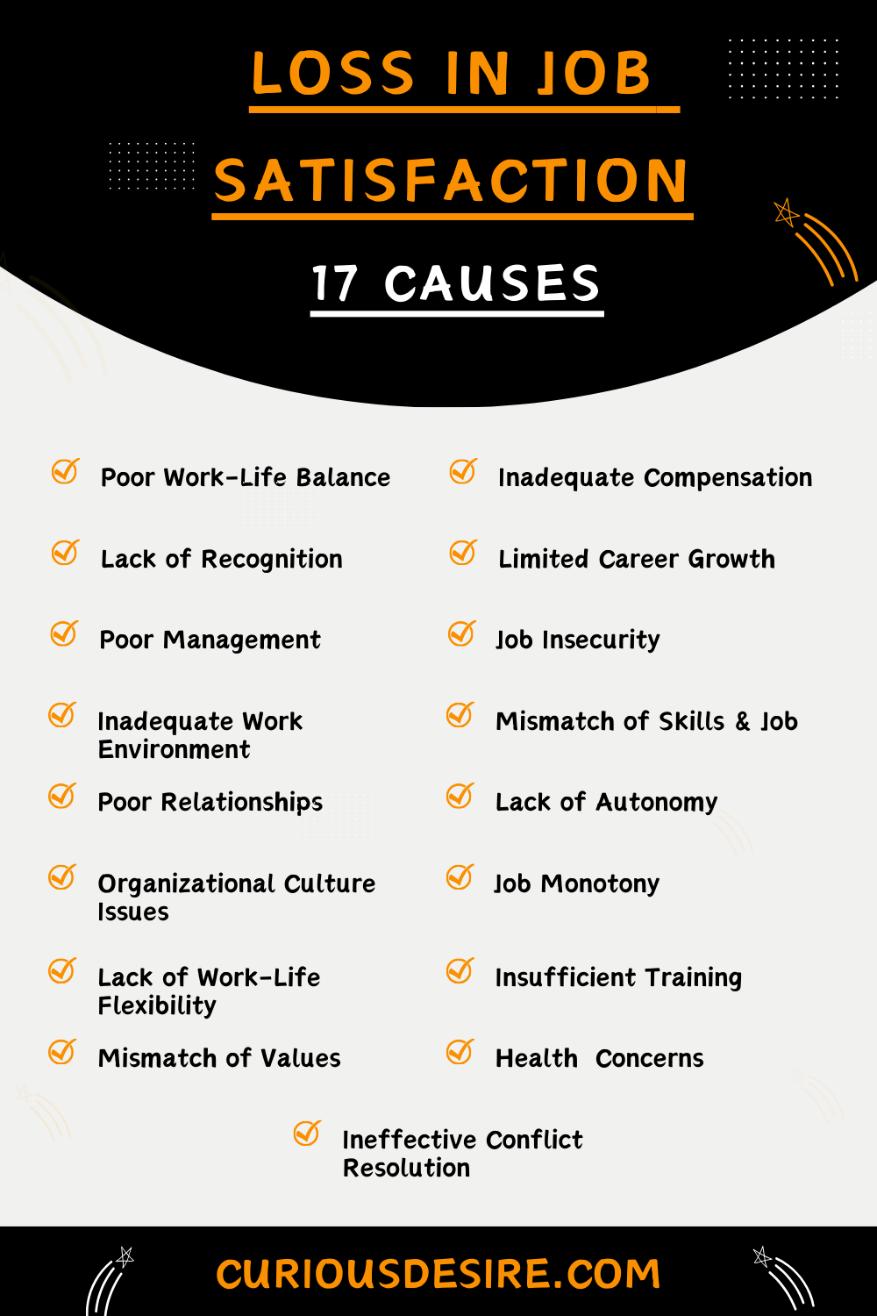Job satisfaction matters for both individual well-being and the overall success of a company.
However, workplaces can face challenges that negatively impact job satisfaction.
Today, we’ll discuss the internal and external factors that contribute to job dissatisfaction, offering insights for strategic interventions.
Let’s get into it!
Here are the top 5 causes of loss in job satisfaction:
- Inadequate Compensation
- Limited Career Growth Opportunities
- Poor Work-Life Balance
- Poor Relationships with Colleagues
- Mismatch of Values
[toc]

Cause 1: Poor Work-Life Balance
Employees often find it challenging to enjoy their normal routines and cherish precious moments due to the demands of extended work hours.
Long working hours and an inability to balance work and personal life can be a major cause of job dissatisfaction.
Also, the struggle to find time for family, hobbies, and relaxation can lead to stress and exhaustion.
The persistent pressure to meet work demands without sufficient time for personal needs not only impacts an individual’s well-being but also diminishes job satisfaction.
Cause 2: Inadequate Compensation
At times, employees may feel dissatisfied when they perceive that their compensation does not align with their skills, efforts, or industry standards.
This discrepancy can lead to a sense of undervaluation, particularly when individuals invest considerable effort in contributing to their organization’s success.
Adequate compensation and benefits are crucial for employees to feel that their hard work is recognized and appropriately rewarded.
A fair and competitive compensation structure significantly contributes to overall job satisfaction.
Cause 3: Lack of Recognition and Appreciation
A common complaint among employees is the absence of acknowledgment or praise for their hard work and achievements.
Everyone desires to be recognized for their contributions, and a lack of appreciation can lead to feelings of being undervalued.
Regular feedback and recognition not only boost morale but also contribute to a positive work environment.
When efforts go unnoticed, employees lose motivation and experience a decline in job satisfaction.

Cause 4: Limited Career Growth Opportunities
As individuals aspire to progress in their careers, a lack of opportunities for professional development and advancement can contribute to dissatisfaction.
Employees want to feel that their organization invests in their growth and values their potential.
Without clear paths for career progression, employees feel stagnant and unfulfilled.
Cause 5: Poor Leadership and Management
Ineffective or unsupportive leadership can have a profound impact on a team’s motivation to work and perform well.
Issues such as unclear communication, lack of guidance, and a toxic work environment can create a negative atmosphere.
Employees need strong leadership that provides clear direction, support, and a healthy work culture.
When leadership falls short, it can lead to frustration and disappointment that leads to loss of job satisfaction.
Cause 6: Job Insecurity
Uncertainty about job stability, fear of layoffs, or a lack of job security significantly affects an individual’s sense of satisfaction in their role.
Job insecurity creates stress and anxiety, as employees worry about their future within the organization.
A stable and healthy work environment is essential for employees to feel confident and satisfied in their jobs.

Cause 7: Inadequate Work Environment
Unpleasant or uncomfortable workspaces, along with inadequate resources and poor working conditions, contribute to dissatisfaction.
A positive work environment is crucial for employees to thrive. Issues such as outdated equipment, lack of necessary tools, or uncomfortable physical spaces can negatively impact job satisfaction.
Employees need a conducive work environment to perform their best and feel satisfied in their roles.
Cause 8: Mismatch of Skills and Job Responsibilities
If employees feel that their skills are not being fully utilized or that their job roles do not align with their interests and strengths, it can lead to dissatisfaction.
Individuals seek roles that challenge them and allow them to leverage their skills effectively.
When there is a mismatch, employees feel unfulfilled and undervalued.
Cause 9: Poor Relationships with Colleagues
Workplace conflicts, a lack of teamwork, or difficult relationships with colleagues contribute to a negative work environment.
Positive interpersonal relationships are crucial for a healthy workplace culture.
When conflicts arise or teamwork is lacking, it can create a stressful atmosphere, negatively impacting job satisfaction.
Cause 10: Lack of Autonomy and Control
Micromanagement and a lack of autonomy can lead to frustration among employees who feel their abilities and judgment are not trusted.
Employees thrive when given the freedom to make decisions and contribute to the success of their projects.
This sense of control over one’s work contributes positively to job satisfaction, as individuals feel a deeper connection to their responsibilities and the overall success of the projects they are involved in.
However, when autonomy is lacking, it can lead to a sense of disempowerment.
They might feel constrained by rigid structures, limiting their ability to make decisions independently.
This restriction can lead to frustration, as employees may perceive their skills and expertise as underutilized.
Cause 11: Organizational Culture Issues
A toxic or unsupportive organizational culture, including discrimination, favoritism, or lack of inclusivity, negatively impacts job satisfaction.
Employees want to work in an environment that values diversity, promotes fairness, and supports a positive culture.
When organizational culture falls short, it can create a sense of alienation and dissatisfaction among employees.
Cause 12: Job Monotony and Boredom
Repetitive tasks or a lack of variety in job responsibilities lead to boredom and a decline in satisfaction.
Employees seek roles that challenge and engage them. When jobs become monotonous, employees lose interest and motivation.

Cause 13: Lack of Work-Life Flexibility
Cause 14: Insufficient Training and Development
If employees feel that they lack the necessary skills for their jobs or are not provided with adequate training opportunities, it can lead to dissatisfaction and hinder professional growth.
Continuous learning and development are essential for individuals to stay relevant in their roles and contribute effectively.
When training and development opportunities are insufficient, employees may feel stagnant and dissatisfied.
Cause 15: Mismatch of Values
Misalignment between personal values and the values of the organization can cause discomfort and dissatisfaction among employees who do not resonate with the company’s mission or ethical standards.
Individuals seek alignment with the values of their workplace to feel a sense of purpose and connection. When values are mismatched, it can lead to a lack of motivation to perform the best.
Loss in Job Satisfaction Causes – FAQs
1. Which 4 are sources of job satisfaction?
Job satisfaction can stem from various sources, including:
- Meaningful Work: Employees derive satisfaction from work that aligns with their values and provides a sense of purpose.
- Supportive Leadership: A positive relationship with supervisors and leaders, characterized by clear communication and support, enhances job satisfaction.
- Career Development Opportunities: The chance for professional growth and development within the organization is a key source of satisfaction.
- Positive Workplace Relationships: A supportive and collaborative team environment fosters job satisfaction, as interpersonal relationships play a crucial role in overall happiness at work.
2. What are the 4 employee responses to dissatisfaction?
Employees may respond to job dissatisfaction in various ways, such as:
- Job Withdrawal: This includes absenteeism, tardiness, or a decline in effort and productivity as a reaction to dissatisfaction.
- Voice: Employees may express their dissatisfaction through constructive feedback, suggestions, or discussions with superiors in an attempt to improve the work situation.
- Neglect: Neglect involves reducing effort or attention to tasks without actively addressing the dissatisfaction, leading to a decline in overall performance.
- Exit: The most extreme response is leaving the organization, either through resignation or seeking alternative employment.
3. What are the five major causes of job satisfaction?
Five major causes of job satisfaction include:
- Job Characteristics: The nature of the work, the level of autonomy, and the degree of challenge can significantly impact job satisfaction.
- Pay and Benefits: Fair compensation and attractive benefits contribute to overall satisfaction.
- Organizational Culture: A positive and inclusive culture fosters a sense of belonging and satisfaction among employees.
- Work-Life Balance: Striking a balance between professional and personal life positively influences job satisfaction.
- Relationships at Work: Positive interactions with colleagues and supervisors play a crucial role in job satisfaction.
4. What are the six major sources of job satisfaction?
Six major sources of job satisfaction include:
- Achievement: Accomplishing tasks and achieving goals contributes to a sense of satisfaction.
- Recognition: Feeling acknowledged and appreciated for one’s contributions boosts job satisfaction.
- The Work Itself: Engaging and meaningful tasks enhance overall job satisfaction.
- Responsibility: Having a sense of ownership and responsibility in one’s role can lead to higher job satisfaction.
- Advancement Opportunities: The prospect of career growth and advancement within the organization is a significant source of satisfaction.
- Work Relationships: Positive relationships with colleagues and supervisors contribute to a satisfying work experience.
5. What is the job satisfaction problem?
The job satisfaction problem refers to instances where employees are dissatisfied with various aspects of their work, which can lead to decreased productivity, increased turnover, and a negative impact on overall organizational success. Addressing this problem requires identifying specific issues and implementing strategies to improve job satisfaction.
6. What are the nine factors of job satisfaction?
While the specific factors may vary, nine common factors influencing job satisfaction include:
- Work Environment
- Job Security
- Recognition and Rewards
- Work-Life Balance
- Meaningful Work
- Supportive Leadership
- Career Development Opportunities
- Positive Workplace Relationships
- Fair Compensation
7. What are the main causes and consequences of job satisfaction?
The main causes of job satisfaction include positive work experiences, supportive leadership, and opportunities for personal and professional growth.
Consequences of job satisfaction include increased productivity, higher employee retention, and a positive impact on organizational success and employee well-being.
8. What is job satisfaction theory?
Job satisfaction theories aim to explain and understand the factors influencing employees’ contentment with their work. Various theories, such as the Job Characteristics Model and the Two-Factor Theory by Herzberg, propose different factors contributing to job satisfaction, providing frameworks for organizations to enhance employee well-being.
9. How do you promote job satisfaction?
Promoting job satisfaction involves:
- Creating a Positive Work Environment: Fostering a supportive, inclusive, and positive workplace culture.
- Providing Recognition: Acknowledging and rewarding employees for their contributions.
- Offering Career Development Opportunities: Encouraging and supporting professional growth within the organization.
- Ensuring Fair Compensation: Providing competitive and fair pay and benefits.
- Encouraging Work-Life Balance: Supporting flexibility and understanding personal needs.
10. What are the three outcomes of job satisfaction?
Three outcomes of job satisfaction include:
- Increased Productivity: Satisfied employees are often more engaged and productive in their roles.
- Higher Employee Retention: Job satisfaction contributes to reduced turnover as content employees are more likely to stay with the organization.
- Positive Organizational Culture: Satisfied employees contribute to a positive and collaborative organizational culture.
11. What are the five facets of job satisfaction?
The five facets of job satisfaction, as identified by the Job Descriptive Index (JDI), include:
- Work Itself: Satisfaction with the nature of the work.
- Supervision: Satisfaction with the guidance and support provided by supervisors.
- Coworkers: Satisfaction with relationships and collaboration with colleagues.
- Promotion Opportunities: Satisfaction with the chances for career advancement.
- Salary: Satisfaction with compensation and benefits.
12. What are the three outcomes of job satisfaction?
The three outcomes of job satisfaction are:
- Increased Productivity: Satisfied employees tend to be more motivated and engaged, leading to higher levels of productivity.
- Higher Employee Retention: Job satisfaction contributes to reduced turnover, as content employees are more likely to stay with the organization.
- Positive Organizational Culture: Satisfied employees play a key role in fostering a positive and collaborative organizational culture.